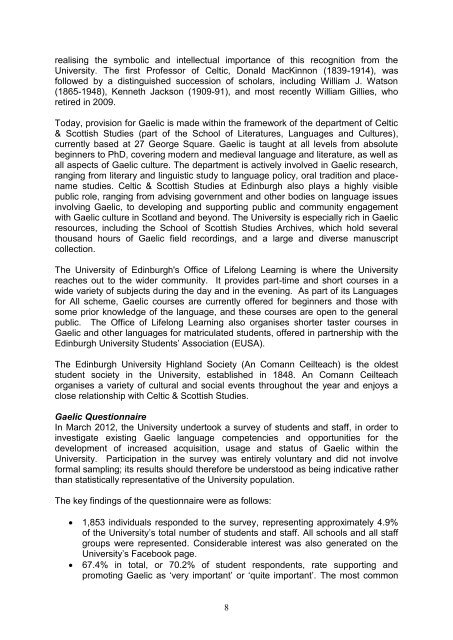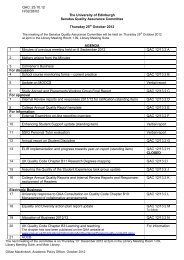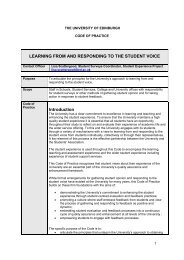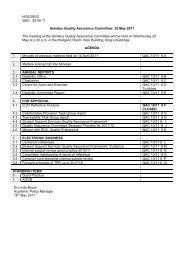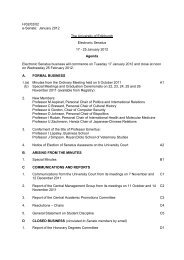Chapter 3 â Policy Implications for Gaelic - University of Edinburgh
Chapter 3 â Policy Implications for Gaelic - University of Edinburgh
Chapter 3 â Policy Implications for Gaelic - University of Edinburgh
You also want an ePaper? Increase the reach of your titles
YUMPU automatically turns print PDFs into web optimized ePapers that Google loves.
ealising the symbolic and intellectual importance <strong>of</strong> this recognition from the<br />
<strong>University</strong>. The first Pr<strong>of</strong>essor <strong>of</strong> Celtic, Donald MacKinnon (1839-1914), was<br />
followed by a distinguished succession <strong>of</strong> scholars, including William J. Watson<br />
(1865-1948), Kenneth Jackson (1909-91), and most recently William Gillies, who<br />
retired in 2009.<br />
Today, provision <strong>for</strong> <strong>Gaelic</strong> is made within the framework <strong>of</strong> the department <strong>of</strong> Celtic<br />
& Scottish Studies (part <strong>of</strong> the School <strong>of</strong> Literatures, Languages and Cultures),<br />
currently based at 27 George Square. <strong>Gaelic</strong> is taught at all levels from absolute<br />
beginners to PhD, covering modern and medieval language and literature, as well as<br />
all aspects <strong>of</strong> <strong>Gaelic</strong> culture. The department is actively involved in <strong>Gaelic</strong> research,<br />
ranging from literary and linguistic study to language policy, oral tradition and placename<br />
studies. Celtic & Scottish Studies at <strong>Edinburgh</strong> also plays a highly visible<br />
public role, ranging from advising government and other bodies on language issues<br />
involving <strong>Gaelic</strong>, to developing and supporting public and community engagement<br />
with <strong>Gaelic</strong> culture in Scotland and beyond. The <strong>University</strong> is especially rich in <strong>Gaelic</strong><br />
resources, including the School <strong>of</strong> Scottish Studies Archives, which hold several<br />
thousand hours <strong>of</strong> <strong>Gaelic</strong> field recordings, and a large and diverse manuscript<br />
collection.<br />
The <strong>University</strong> <strong>of</strong> <strong>Edinburgh</strong>'s Office <strong>of</strong> Lifelong Learning is where the <strong>University</strong><br />
reaches out to the wider community. It provides part-time and short courses in a<br />
wide variety <strong>of</strong> subjects during the day and in the evening. As part <strong>of</strong> its Languages<br />
<strong>for</strong> All scheme, <strong>Gaelic</strong> courses are currently <strong>of</strong>fered <strong>for</strong> beginners and those with<br />
some prior knowledge <strong>of</strong> the language, and these courses are open to the general<br />
public. The Office <strong>of</strong> Lifelong Learning also organises shorter taster courses in<br />
<strong>Gaelic</strong> and other languages <strong>for</strong> matriculated students, <strong>of</strong>fered in partnership with the<br />
<strong>Edinburgh</strong> <strong>University</strong> Students’ Association (EUSA).<br />
The <strong>Edinburgh</strong> <strong>University</strong> Highland Society (An Comann Ceilteach) is the oldest<br />
student society in the <strong>University</strong>, established in 1848. An Comann Ceilteach<br />
organises a variety <strong>of</strong> cultural and social events throughout the year and enjoys a<br />
close relationship with Celtic & Scottish Studies.<br />
<strong>Gaelic</strong> Questionnaire<br />
In March 2012, the <strong>University</strong> undertook a survey <strong>of</strong> students and staff, in order to<br />
investigate existing <strong>Gaelic</strong> language competencies and opportunities <strong>for</strong> the<br />
development <strong>of</strong> increased acquisition, usage and status <strong>of</strong> <strong>Gaelic</strong> within the<br />
<strong>University</strong>. Participation in the survey was entirely voluntary and did not involve<br />
<strong>for</strong>mal sampling; its results should there<strong>for</strong>e be understood as being indicative rather<br />
than statistically representative <strong>of</strong> the <strong>University</strong> population.<br />
The key findings <strong>of</strong> the questionnaire were as follows:<br />
1,853 individuals responded to the survey, representing approximately 4.9%<br />
<strong>of</strong> the <strong>University</strong>’s total number <strong>of</strong> students and staff. All schools and all staff<br />
groups were represented. Considerable interest was also generated on the<br />
<strong>University</strong>’s Facebook page.<br />
67.4% in total, or 70.2% <strong>of</strong> student respondents, rate supporting and<br />
promoting <strong>Gaelic</strong> as ‘very important’ or ‘quite important’. The most common<br />
8


